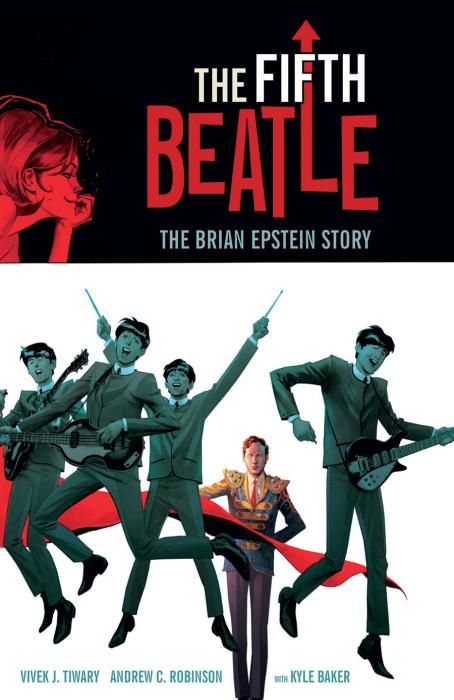There is no one in the civilized world who doesn't know of The Beatles, but there are many who probably don't know of Brian Epstein, the band's manager and driving force behind their worldwide success. "The Fifth Beatle: The Brian Epstein Story" by Vivek J. Tiwary, Andrew C. Robinson and Kyle Baker tells the fascinating but ultimately tragic story of the ambitious and far-seeing leader who guided The Beatles to the heights they achieved, even as he struggled privately searching for personal happiness that he never found.
Just as Epstein saw something good in The Beatles that he could turn into something great, Tiwary sees the same in Epstein's time with the group, and crafts a story that's every bit as engaging as that of The Fab Four themselves. Central to Tiwary's story, and Epstein's life, was being a homosexual in a time and place where such a lifestyle was not only looked down upon, but was actually illegal. Outwardly, Epstein's life, from his younger days working in a family record store business to his days managing the world's most famous rock n roll band, appears to be one full of success and happiness. Tiwary shows that there was no shortage of the former, and in fact the repeated and unprecedented successes of Epstein's career were almost compensatory but ultimately failed surrogates for the happiness he could never achieve. Tiwary stops short of implying that it was Epstein's inner unhappiness that fueled his drive for success, but it raises a poignant possibility: maybe all he needed was love. Or as Tiwary puts it, "no one understands what it's like when the screams die down." The empathy for Epstein is pervasive; it's impossible not to feel for a man who seemingly had it all, but in truth felt very, very empty.
Through all of the feelings of emptiness, though, Tiwary doesn't forget that the story is also about Epstein's accomplishments and his visionary ideals that took The Beatles to uncharted musical territory and pop-culture influence. His early interactions with the band are impressively realistic; their initial meetings read with truthful-sounding and in-character precision, and one can almost hear the band members' voices in their dialogue. These moments show Epstein's commanding presence and gift of leadership, establishing early on that yes; this really is the guy who made The Beatles into what they became. Within it all are the band's trademark humor and wit; the banter and exchanges between Epstein and the group read like they could have come from a behind-the-scenes documentary. Tiwary's grasp of Beatles' history is impressive, but more so is his ability to translate it into not only this story, but to filter it through Epstein's mindset.
The dichotomy of Epstein's life is remarkably captured by Robinson, starting immediately with a somber, dreary map-like view of nighttime Liverpool, a Liverpool that remains cast in blue and grey tones even as the story moves to street level, and daylight. There's no real color in Epstein's world until he discovers The Beatles in a dingy basement club, and once this happens, his world becomes a brighter and more colorful one. Robinson's capture of Epstein's immediate enthrallment with the band is absolutely perfect, and recognizable to any fans of the group and their own very first exposure. Just as importantly, Robinson captures the likenesses of the band, balanced flawlessly halfway between caricature and realism, avoiding the distraction from being too lifelike and the annoyance of being unrecognizable.
Baker is called in on some of the more unfortunate episodes in Beatles history, among them their troublesome tour in the Philippines and the backlash from John Lennon's infamous "We're bigger than Jesus!" comment. Baker renders these with an appropriately comedic tone paying homage to the classic cartoon from that era. With the passing of time, those incidents seem a lot funnier now than they did back then, so the switch to Baker's style is a brilliant move, before switching back to Robinson and the increasingly troubling latter days of Epstein's life and his struggle with drug addiction.
Tiwary gives Epstein's final moments an almost Kubrick-esque kind of surreal quality, neither surrounded not with bright colors nor dreary grey, but almost all white, as though to signify that his life is near its end. There is a dream-like, hallucinogenic vibe throughout the sequence, with nothing really to focus on except Epstein and his final thoughts. With all of the extravagance and decadence gone, the end is a genuinely moving moment that perfectly caps off an all-but flawless chronicle of a life's story that is largely unknown. "The Fifth Beatle: The Brian Epstein Story" accomplishes all of its goals: it takes the readers and Beatles fans backstage to get to know the man who made the band into a phenomenon and shows what an accomplished yet lonely man he was; it's captivating, brilliant, funny, and tragic, and it artistically captures every mood and locale associated with this era of Beatlemania. It's a must-have for Beatles fans and fans of great storytelling.

